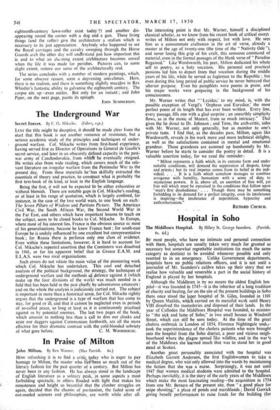In Praise of Milton
John Milton. By Rex Warner. (Max Parrish. 6s.) How refreshing it is to find a critic t2day who is eager to pay homage to Milton, the master who f?aPbeen so much out of the literary fashion for the past quarter of a century. But Milton has never been in any fashion. He has always stood in the landscape of English literature as a solitary peak, in some aspects a most forbidding spectacle, in others flooded with light that makes his remoteness and height so beautiful that the climber struggles on again, decided that the chasms of puritanism, the faded scree of out-moded sciences and philosophies, are worth while after all. The interesting point is that Mr. Warner, himself a disciplined classical scholar, as we know from his recent book of critical essays, writes of Milton not only with respect, but with love. He sees him as a consummate craftsman in the art of verse, already a master at the age of twenty-one (the time of the " Nativity Ode "), and never losing this grip of his craft, this sensuous command of material, even in the formal passages of the blank verse of " Paradise Regained." Like Wordsworth, his peer, Milton dedicated his whole self to poetry, as a holy vocation. His personal and practical passions led him to depart from that vocation during the middle years of his life, while he served as fugleman to the Republic; but even during this long period of public service he never betrayed that ulterior purpose. Even his pamphlets were poems in prose, and his major works were .preparing in the background of his consciousness.
Mr. Warner writes that " Lycidas,' to my mind, is, with the possible exception of Vergil's Orpheus and Eurydice,' the most perfect poem of its length that has ever been written. Every line, every passage, fills one with a glad surprise ; an unearthly simplicity flows, as in the music of. Mozart, from so much intricacy." That gives the lie direct to Dr. Johnson ; and Time, the arch-critic, sides with Mr. Warner, not only generally, but as monitor to one's private taste. I find that, as the decades pass, Milton, again like Wordsworth, reveals in his work more and more technical delights, as well as the satisfactions contained in mental and emotional grandeur. Those grandeurs are summed up handsomely by Mr. Warner before he starts' to consider the poetry in detail. It is a valuable assertion today, for we need the reminder:
" Milton represents a faith which, in its extreme form and under suitable conditions, will demand the suppression of despots, kings and priests t but its real impetus comes from its belief in the indi- vidual. . . . It is a faith which somehow manages to combine arrogance with humility, humanism with a sense of duty to mysterious powers. It is, above all, an assertion of free will, yet free will which must be exercised in the conditions that follow upon man's first disobedience.' . . . Though there may be something forbidding in its demand for a perfect integrity, even its intolerance is inspiring—the intolerance of superstition, hypocrisy and authoritarianism."
RICHARD CHURCH.


































 Previous page
Previous page